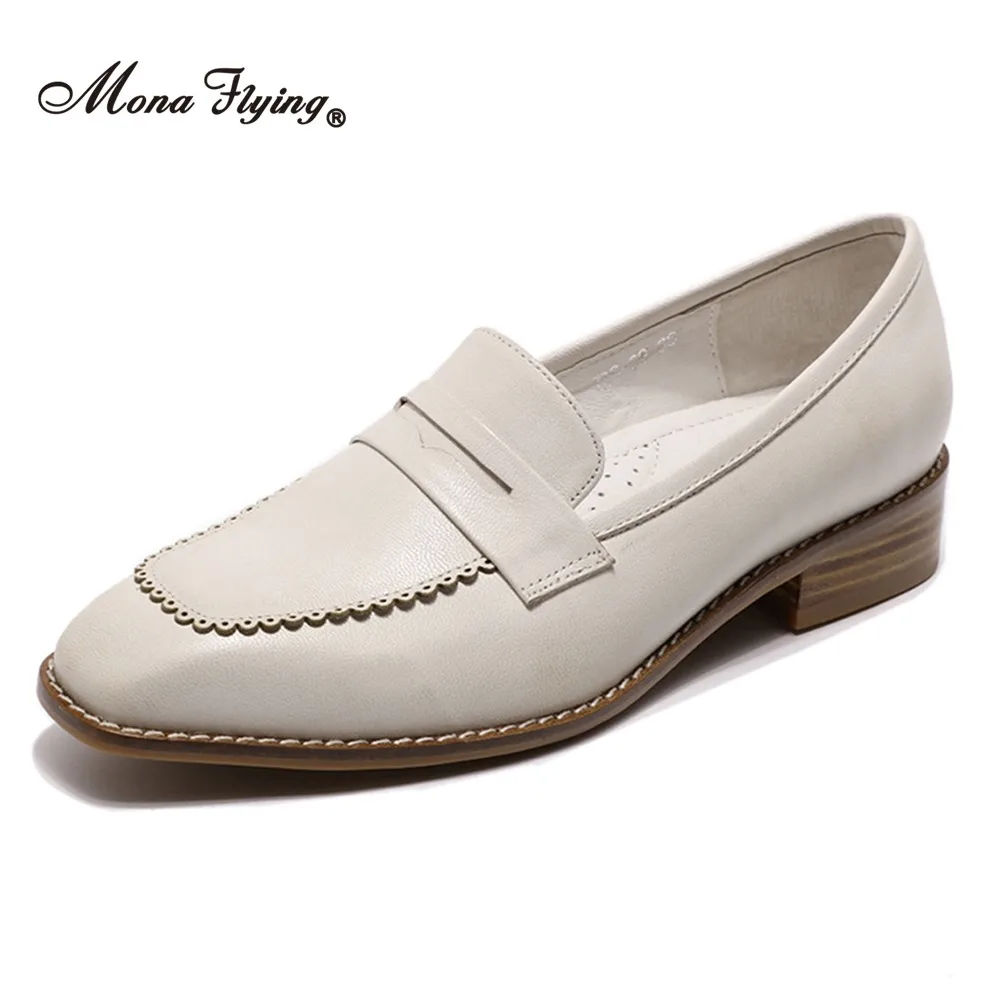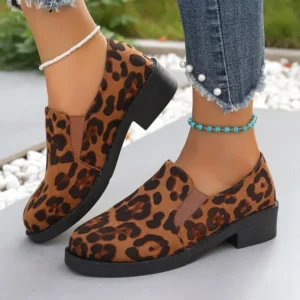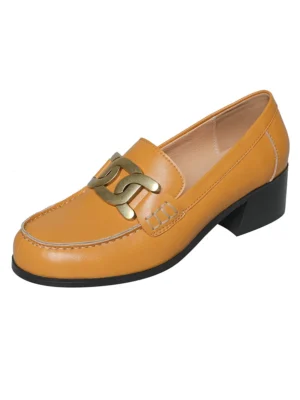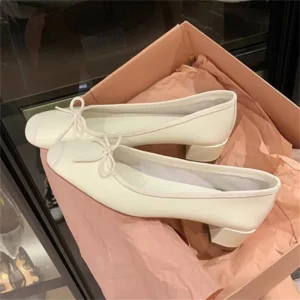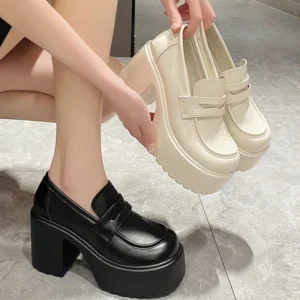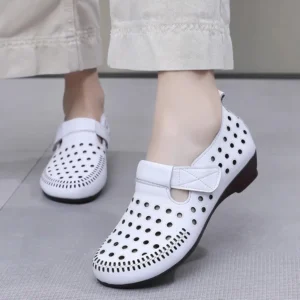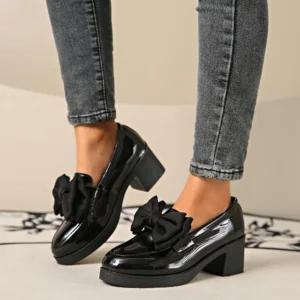Why Quality Leather Matters for Heeled Loafers
When investing in a pair of heeled loafers, the quality of leather used is perhaps the most crucial factor determining how they’ll perform over time. Superior leather directly influences comfort as it gradually molds to your unique foot shape, creating a custom fit that mass-produced synthetic alternatives simply cannot match. The right leather choice transforms a simple shoe into a versatile wardrobe staple that transitions seamlessly between professional settings, casual outings, and special occasions.
The leather type you select significantly impacts your loafer’s longevity and value proposition. High-quality leather may require a larger initial investment but delivers superior cost-per-wear value as these shoes often last for years or even decades with proper care. This durability factor makes understanding leather quality essential for making informed purchasing decisions.
Women seeking versatile footwear for the workplace can benefit from understanding how different professional office loafer outfits can be complemented by specific leather types. Whether you’re considering a classic penny loafer or something more contemporary, Artisan Haul’s collection of women’s leather heeled loafers offers options crafted from various premium leathers to suit different needs and preferences.
In this comprehensive guide, we’ll explore the characteristics of different leather types used in heeled loafers, how to identify quality materials, and which options best suit various lifestyles and preferences.
Understanding Leather Terminology for Footwear
Before diving into specific leather types, it’s important to understand the key terminology used in the footwear industry to describe different leather qualities:
Full-grain leather is considered the highest quality leather available. It retains the entire grain surface of the hide with all its natural markings and character. No sanding or buffing is done to remove imperfections, resulting in:
– Exceptional durability due to tight fiber structure
– Development of a beautiful patina over time
– Superior breathability
– Greater moisture resistance
Top-grain leather is created by sanding away the uppermost layer of the hide to remove imperfections. This process results in:
– A more uniform appearance than full-grain
– Good durability, though not quite as strong as full-grain
– Less breathability due to the treatment process
– A more consistent look that some prefer for dress shoes
Corrected-grain leather has been more heavily sanded to remove flaws and then embossed with an artificial grain pattern. Meanwhile, genuine leather is a lower quality grade made from the hide layers remaining after the top layers have been split off for higher-grade leathers.
The tanning process also significantly impacts leather properties. Chrome tanning is a modern, efficient method that produces soft, pliable leather in a wide range of colors, while vegetable tanning uses natural tannins from plant materials to create firmer leather that develops rich patina but may be less water-resistant initially.
Understanding how to properly wear loafers in an office setting requires knowledge of which leather types project the appropriate level of professionalism. Additionally, extending the life of your investment requires following the ultimate guide to pristine leather loafers with leather-specific care techniques.
Premium Leather Types for Heeled Loafers
Calfskin: The Luxury Standard
Calfskin leather is derived from young cattle and is prized for its exceptionally soft hand feel combined with impressive durability. The fine, tight grain pattern creates a smooth surface that takes on a subtle shine with minimal polishing, making it ideal for refined heeled loafers.
Pros:
– Incredibly soft and comfortable from the first wear
– Fine, uniform grain with elegant appearance
– Excellent balance of flexibility and structure
– Takes polish beautifully for a sophisticated finish
– Ages gracefully with proper care
Cons:
– Premium pricing reflects its luxury status
– Requires regular maintenance to maintain appearance
– Can be susceptible to scratches without protective treatment
Calfskin heeled loafers are particularly suited for formal business environments, special occasions, and situations where making a refined impression matters. Their luxurious look and feel make them a cornerstone of any quality footwear collection, including many styles from our women’s high heel loafers collection.
Full-Grain Leather: The Durable Classic
Full-grain leather represents the pinnacle of durability in leather footwear. By preserving the hide’s natural outer layer, this leather retains its natural strength while developing a beautiful, unique character over time.
Pros:
– Exceptional longevity with proper care
– Develops a rich, personalized patina with use
– Maintains breathability that improves comfort
– Natural variations give each pair unique character
– Becomes more comfortable without losing structure
Cons:
– Requires a longer break-in period than softer leathers
– Natural markings may not appeal to those who prefer uniformity
– Generally commands a higher price point
– May initially feel stiffer than processed leathers
Full-grain leather heeled loafers are perfect for women seeking an investment piece that will last for years. They work beautifully in business casual loafer outfits where durability meets style. Over time, these loafers become more personalized and comfortable while maintaining their structural integrity.
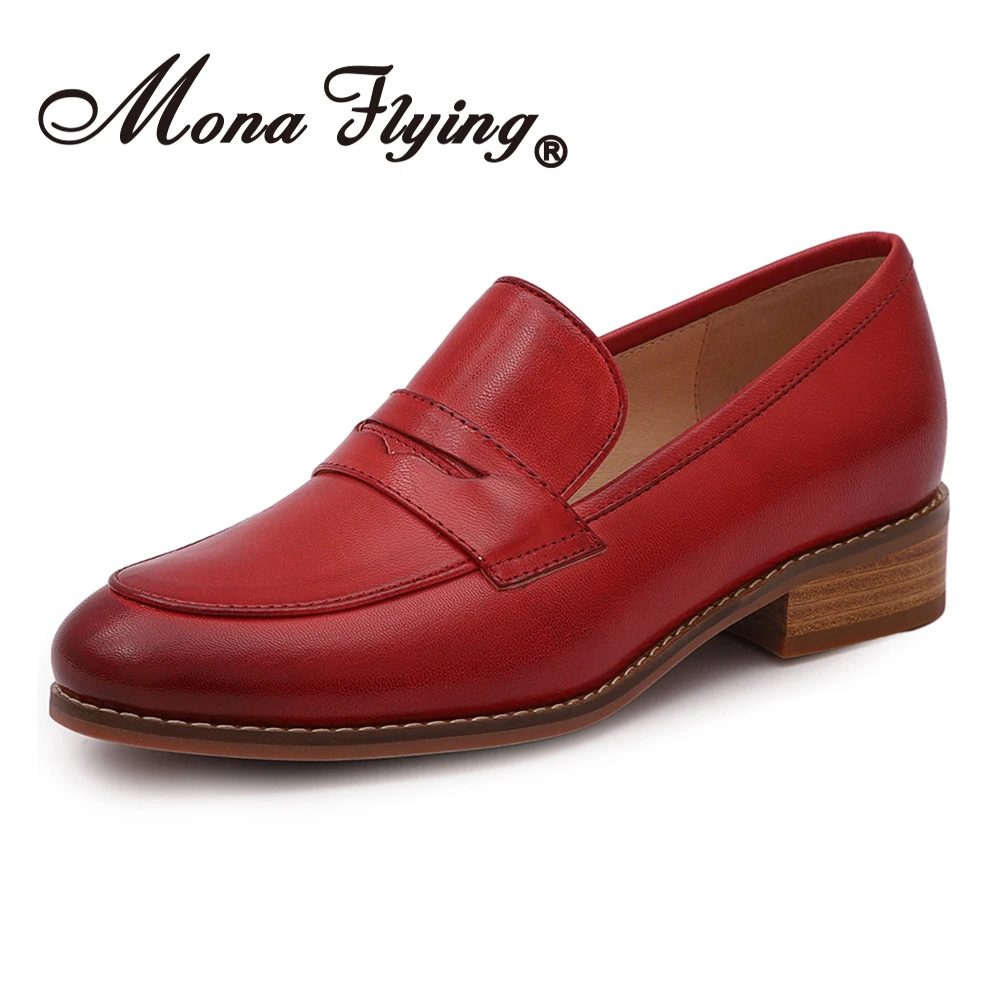
Suede: Elegant Softness
Suede is created by working with the inner split of the hide and raising its nap to create a distinctive velvety texture. This process results in a material that’s immediately recognizable for its soft, brushed appearance and luxurious feel.
Pros:
– Luxuriously soft texture and immediate comfort
– Casual elegance that dresses up or down with ease
– Vibrant color absorption for rich, nuanced hues
– Lightweight flexibility ideal for all-day wear
– Creates visual interest through texture contrast
Cons:
– Higher maintenance requirements than smooth leathers
– More vulnerable to moisture and staining
– Shows wear more quickly, particularly in high-friction areas
– Seasonal limitations in wet or snowy climates
Suede heeled loafers offer a sophisticated yet approachable aesthetic perfect for creative workplaces, weekend brunches, or evening social events. For those seeking this elegant texture in a classic design, our women’s suede penny loafers provide the perfect blend of traditional styling with contemporary comfort.
Nubuck: Refined Durability
Nubuck is created by lightly sanding or buffing the outer grain surface of the leather to create a velvet-like surface. Unlike suede (which comes from the inner split), nubuck is created from the stronger exterior hide, resulting in greater durability while maintaining a luxurious feel.
Pros:
– More durable and dirt-resistant than suede
– Soft, velvety texture with sophisticated appearance
– Retains more natural strength due to its top-grain origin
– Better water resistance than suede with proper treatment
– Attractive matte finish that hides minor scuffs
Cons:
– Still requires more maintenance than smooth leathers
– Can show darkening at flex points over time
– Higher cost than standard suede options
– Special cleaning products required for maintenance
Nubuck heeled loafers bridge the gap between casual and formal, making them versatile additions to a well-rounded footwear collection. They’re particularly well-suited for business casual environments or situations where you need both comfort and sophistication.
Patent Leather: Glossy Sophistication
Patent leather is distinguished by its high-gloss, mirror-like finish created by applying a plastic coating to the leather surface. This treatment creates a distinctive formal appearance that catches the light and adds a touch of glamour to heeled loafers.
Pros:
– Eye-catching glossy finish makes a bold statement
– Excellent water resistance due to sealed surface
– Easy to wipe clean compared to other leather types
– Maintains its polished appearance with minimal effort
– Adds formal sophistication to any outfit
Cons:
– Less breathable due to the coating process
– Can crease and crack over time if not properly cared for
– Limited stretch means fit must be precise from the start
– Generally less comfortable in hot weather
Patent leather heeled loafers excel in formal and evening settings where their distinctive shine complements dressier attire. They’re also an excellent choice for adding a touch of glamour to otherwise simple outfits. Our women’s block heel loafers in patent leather offer stability with sophistication for special occasions.
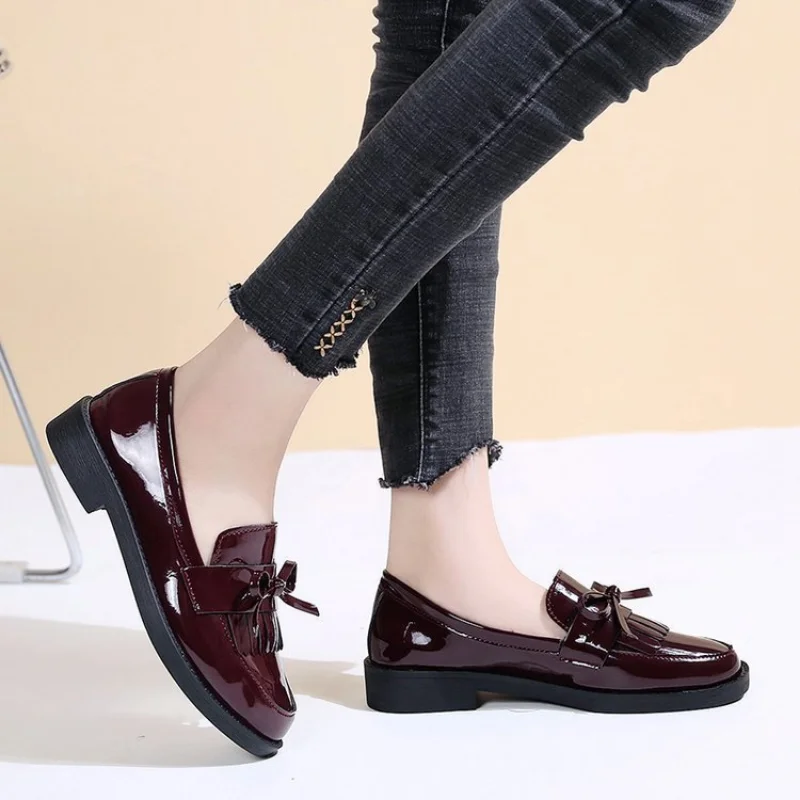
Shell Cordovan: The Heirloom Investment
Shell Cordovan is an exceptionally rare and sought-after leather made from a specific part of horsehide. This specialized material undergoes an intensive six-month tanning process, resulting in a distinctive leather known for its durability and unique finishing properties.
Pros:
– Extraordinary durability that can last decades
– Develops a distinctive “roll” instead of creasing
– Rich depth of color with unique luster
– Exceptionally water-resistant compared to other leathers
– Becomes more beautiful with age and proper care
Cons:
– Significant premium price point
– Limited availability due to scarcity
– Longer break-in period than other premium leathers
– Requires specific care products for optimal maintenance
Shell Cordovan heeled loafers represent the pinnacle of footwear investment—these are heirloom-quality pieces that can last for generations with proper care. They’re ideal for the discerning buyer who values longevity, craftsmanship, and the unique properties that only this rare leather can provide.
Comparative Analysis of Leather Types for Heeled Loafers
| Leather Type | Durability | Comfort | Break-in Time | Maintenance | Formality | Weather Resistance | Relative Cost |
|---|---|---|---|---|---|---|---|
| Calfskin | High | Very High | Short | Moderate | High | Moderate | $$$$ |
| Full-Grain | Very High | High (improves) | Moderate | Low | High | Good | $$$$ |
| Suede | Moderate | Very High | Very Short | High | Moderate | Poor | $$$ |
| Nubuck | High | High | Short | Moderate-High | Moderate | Fair | $$$$ |
| Patent | Moderate | Low-Moderate | Long | Low | Very High | Very Good | $$$ |
| Shell Cordovan | Exceptional | High (improves) | Long | Moderate | High | Excellent | $$$$$ |
| Genuine Leather | Low | Moderate | Varies | Moderate | Low | Poor | $$ |
This comparative table helps illustrate the trade-offs between different leather types. Your ideal choice depends on your specific priorities—whether you value immediate comfort, long-term durability, ease of maintenance, or formal appearance. For those seeking comprehensive information about making the right choice, our definitive guide to wearing leather heeled loafers provides additional context and styling advice.
How Leather Affects Structure and Comfort in Heeled Loafers
The leather type significantly influences both how a heeled loafer supports your foot and how comfortable it feels throughout the day. This relationship between material and structure is particularly important in heeled designs where proper support is essential.
Structural Support
Firmer leathers like full-grain and shell cordovan provide excellent stability around the heel counter, helping maintain proper alignment and preventing the heel from slipping. This structural integrity is crucial for preventing foot fatigue and ensuring lasting comfort in heeled designs.
Break-in Period
Softer leathers like calfskin and suede require minimal break-in time, offering comfort from the first wear. In contrast, sturdier options like shell cordovan may need several wearings to conform to your foot shape but ultimately provide superior long-term support. This trade-off between immediate comfort and lasting structure is an important consideration when selecting leather loafers.
Breathability
Natural, minimally treated leathers allow air circulation that keeps feet comfortable throughout the day. Patent leather and heavily treated hides offer less breathability, potentially causing discomfort during extended wear or in warmer weather. The women’s square heel loafers in our collection balance structural support with comfort through careful leather selection.
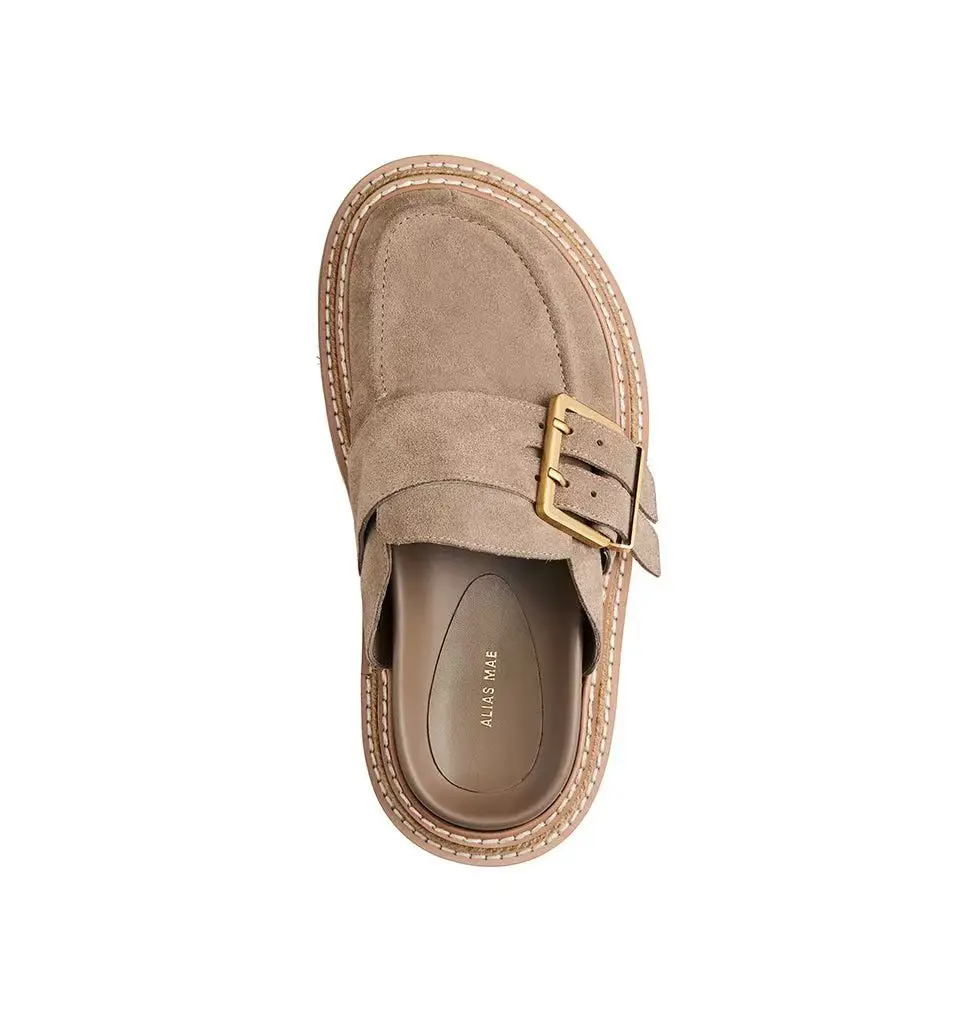
Essential Care for Leather Heeled Loafers
Proper care significantly extends the life of your leather loafers while maintaining their appearance and comfort. Each leather type requires specific attention:
General Care Principles:
– Allow 24-hour rest between wearings to dry completely
– Use cedar shoe trees to maintain shape and absorb moisture
– Clean and condition regularly based on frequency of wear
– Address stains and scuffs promptly before they set
– Store properly in dust bags away from direct sunlight
For Smooth Leathers (Calfskin, Full-Grain):
1. Remove surface dust with a soft brush or cloth
2. Clean with a slightly damp cloth or specialized leather cleaner
3. Apply leather conditioner sparingly with a soft cloth
4. Allow to dry completely before buffing with a horsehair brush
5. Apply a thin layer of polish if desired for shine and protection
For Suede and Nubuck:
1. Brush gently with a suede brush to remove dust and restore nap
2. Use a suede eraser on small stains and marks
3. Apply specialized suede protector spray preventatively
4. Address water spots by lightly dampening the entire area and brushing when dry
For Patent Leather:
1. Wipe clean with a soft, damp cloth
2. Use patent-specific cleaners for stubborn marks
3. Apply a specialized patent restorer to maintain shine
4. Avoid alcohol-based products which can damage the finish
The care principles for heeled loafers are similar to those used for women’s leather flat loafers, though heel areas may require additional attention due to greater stress at these points.
Women's Comfortable Flat Loafers, Women's Leopard Print Loafers, Women's Low Heel Loafers
$82.50 Select options This product has multiple variants. The options may be chosen on the product pageWomen's Block Heel Loafers, Women's Heeled Penny Loafers, Women's Monk Strap Loafers
$194.04 Select options This product has multiple variants. The options may be chosen on the product pageWomen's Block Heel Loafers, Women's Square Heel Loafers, Women's Square Toe Flat Loafers
Price range: $73.61 through $86.41 Select options This product has multiple variants. The options may be chosen on the product pageWomen's Black Platform Loafers, Women's High Heel Loafers, Women's High Platform Loafers, Women's White Platform Loafers
$106.67 Select options This product has multiple variants. The options may be chosen on the product pageWomen's Comfortable Flat Loafers, Women's Leather Flat Loafers, Women's Round Toe Flat Loafers
$124.88 Select options This product has multiple variants. The options may be chosen on the product pageWomen's Black Heeled Loafers, Women's Black Platform Loafers, Women's Block Heel Loafers, Women's Chunky Heel Loafers
$72.58 Select options This product has multiple variants. The options may be chosen on the product page
Choosing the Right Leather for Your Lifestyle
Selecting the ideal leather for your heeled loafers should be a thoughtful process based on your specific needs and lifestyle factors:
For Business Professionals:
– Consider calfskin or full-grain leather for their refined appearance and durability
– Patent leather offers an elegant option for formal business settings
– Darker colors show less wear in high-traffic environments
For Creative/Casual Work Settings:
– Suede and nubuck provide sophisticated texture with a more relaxed feel
– Full-grain leather in rich colors adds character while remaining professional
– Consider comfort-focused designs for long periods of standing or walking
For Variable Weather Conditions:
– Full-grain leather with proper weatherproofing offers the best all-season versatility
– Avoid suede in rainy climates unless properly treated
– Consider seasonal rotation between different leather types
Budget Considerations:
– Quality full-grain leather represents better long-term value despite higher initial cost
– Mid-range options like top-grain calfskin balance quality with affordability
– Investment pieces in shell cordovan offer exceptional longevity for dedicated care-givers
Finding the right balance between your aesthetic preferences, practical needs, and budget ensures your leather loafers will become cherished wardrobe staples. For professional environments, understanding the ultimate guide to women’s loafers for the office can help inform your leather selection.
What to Look for When Buying Leather Heeled Loafers
When evaluating leather heeled loafers, these quality indicators will help you make informed decisions:
Leather Quality Markers:
– Even coloration without blotchiness (except where natural variation is expected)
– Smooth finish without excessive correcting or artificial embossing
– Natural smell rather than heavy chemical odors
– Supple feel that responds to gentle pressure
– Clean, consistent edge finishing
Construction Details:
– Smooth, even stitching with no loose threads
– Secure attachment between upper and sole
– Interior lining that matches the quality of the exterior
– Comfortable insole with proper cushioning
– Heel securely attached with no visible gaps
Red Flags to Avoid:
– Plastic-like smell or appearance suggesting synthetic materials
– Excessive stiffness that suggests poor-quality leather
– Uneven color application or obvious surface treatments
– Rough interior finishing that could cause discomfort
– Visible glue marks where components join
When examining potential purchases, don’t hesitate to ask retailers about the specific leather type, tanning process, and recommended care. Quality manufacturers and retailers will be transparent about these details.

Are Genuine Leather Loafers Worth Buying?
Despite its name suggesting quality, “genuine leather” is actually a specific term indicating a lower grade material made from the hide layers remaining after top-quality portions have been removed. This creates some important considerations:
Understanding the Limitations:
Genuine leather loafers typically won’t offer the same durability, comfort, or aesthetic properties as higher-grade options. They may look acceptable initially but often deteriorate more quickly and don’t develop the desirable patina that premium leathers acquire.
When They Might Be Appropriate:
– As starter shoes for those on strict budgets
– For occasional, limited-wear situations
– When specific style is prioritized over longevity
– As transitional pieces while saving for better quality
Better Alternatives:
Consider top-grain leather options as a middle-ground that offers better quality without the full investment of premium leathers. Many mid-range women’s heeled loafers provide a significant quality improvement over genuine leather for a modest price increase.
Ultimately, genuine leather loafers may satisfy immediate needs, but rarely represent good long-term value compared to higher-quality alternatives that offer superior comfort and longevity.
Can Leather Heeled Loafers Be Worn Year-Round?
With proper selection and care, leather heeled loafers can indeed be versatile year-round footwear, though some seasonal considerations apply:
Summer Considerations:
– Lighter colors reflect heat better for summer comfort
– Unlined or partially lined styles offer better breathability
– Suede can be surprisingly comfortable in warm weather due to its porous nature
– Consider open-back loafer styles for additional ventilation
Winter Adaptations:
– Apply protective sprays before winter exposure, especially for suede
– Full-grain leather with proper weatherproofing handles light snow well
– Consider rubber-soled options for better traction in wet conditions
– Dark colors hide winter salt stains more effectively
Transitional Seasons:
– Keep leather conditioned to prevent cracking from temperature fluctuations
– Allow extra drying time when moving between wet outdoor and dry indoor environments
– Use protective overshoes in extreme conditions rather than exposing fine leathers
With a thoughtfully selected rotation of 2-3 pairs in complementary leather types, you can create a versatile collection that addresses varying seasonal needs while extending the life of each pair through proper rest between wearings.

